 /
/  / / |
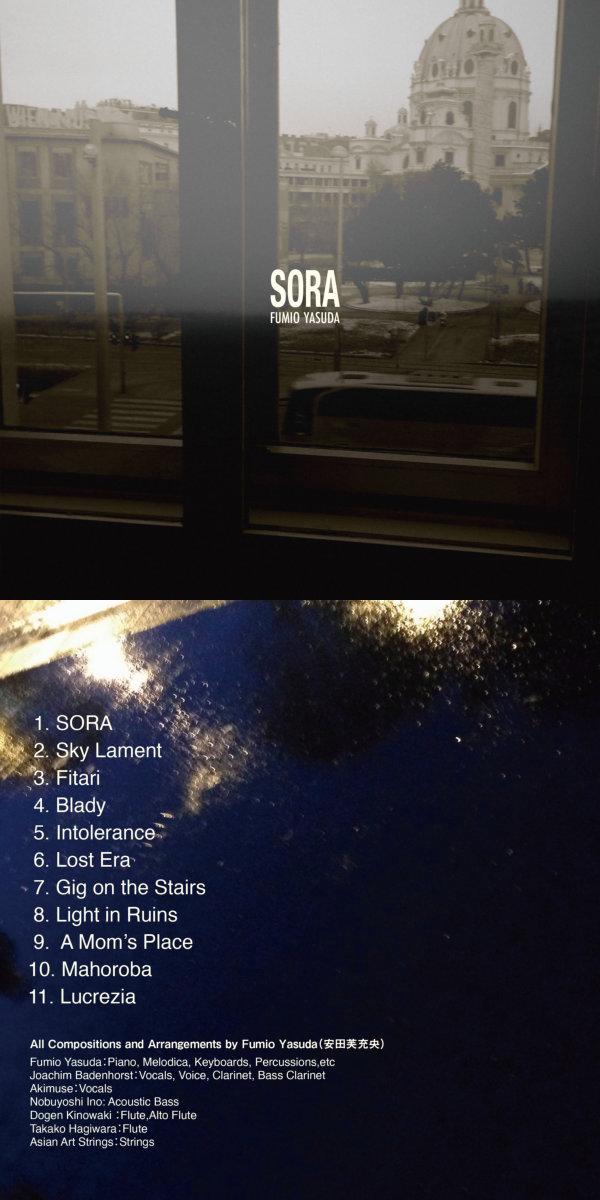
◼️Compositions
1-SORA
2-Sky Lament
3-Fitari
4-Blady
5-Intolerance
6-Lost Era
7-Gig on the Stairs
8-Light in Ruins
9-A Mom’s Place
10-Mahoroba
11-Lucrezia
◼️total time: : 47:30
◼️Musicians
All Compositions and Arrangements by Fumio Yasuda
Piano , Computer , Percussions:Fumio Yasuda
Vocals : Akimuse
Bass Clarinet:Joachim Badenhorst
Acoustic Bass:Nobuyoshi Ino
Flute, Alto Flute:Dogen Kinowaki
Flute:Takako Hagiwara
Strings:Asian Art Strings

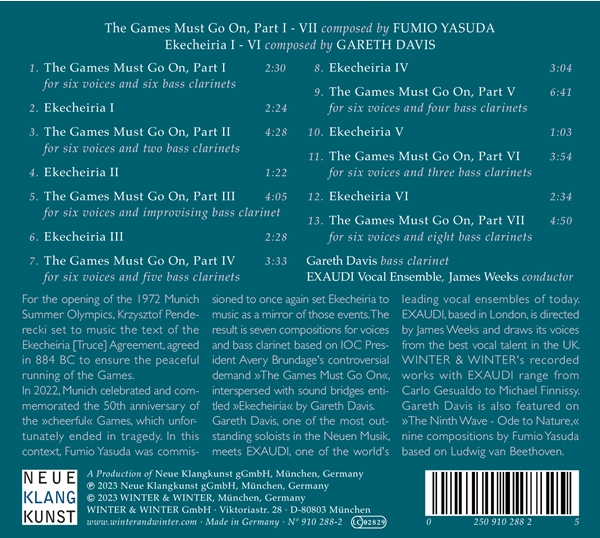
◼️ Fumio Yasuda・Gareth Davis・Exaudi Vocal Ensemble
◼️ X EKECHEIRIA
◼️ Winter & Winter
◼️ Winter & Winter CD No 910 288-2
YOU TUBE
Amazon. de
◼️Total Time
43’5”
EKECHEIRIA for voices and bass clarinet

Olympia 1972 and the musical avant-garde
A look back at the music program created for and around the 1972 Olympic Games in Munich causes astonishment. The people in charge give space to contemporary music. It is quite natural and apparently normal to rely on the avant-garde. This extraordinary musical framework program for the 1972 Olympics has almost been forgotten. The architecture with its transparent, glass tent roof is remembered as a sign of a new, cosmopolitan, modern and democratic Germany, as a counterpoint to the stone Berlin Olympic Stadium of 1936, and the shocking kidnapping of the Israeli athletes, which ended with the death of twelve people, is burned into the memory.
In the Olympic summer of 1972, contemporary music fills the entire city of Munich, Mauricio Kagel plays "Exotica" with curious instruments from the Münchner Stadtmuseum, Karlheinz Stockhausen invites people to his "Sternklang" in the English Garden on starry nights, John Cage, Morton Feldman and Josef Anton Riedl, among others, are heard. Performances will take place throughout the city, and Krzysztof Penderecki will set the text of the Ekecheiria Agreement ('truce agreement') of 884 BC to music at the opening ceremony:
Hold fast to the old custom
Preserve your land
Stay away from war
And give a sign to the world
of brotherly friendship,
When the time of the quadrennial games approaches
50 years later, in the summer of 2022, Munich celebrated the anniversary of the "cheerful" Games, but also remembered the tragedy that so abruptly destroyed the Olympic truce.
For the central anniversary festival in Munich, entitled "Festival des Spiels, des Sport und der Kunst" (Festival of Games, Sports and Art), Neue Klangkunst by Mariko Takahashi and Stefan Winter were commissioned to create a sound installation around the Olympic lake with eight sound sculptures. This work, titled "The Games Must Go On," recalls the still controversial call by then IOC President Avery Brundage who refuses to stop the games because of the assassination attempt.
Takahashi and Winter commission Japanese composer Fumio Yasuda to re-score Ekecheiria as part of "The Games Must Go On" to reflect the events of 1972.
In this context, Fumio Yasuda composes the recording work "The Games Must Go On" for six voices of the Exaudi vocal ensemble conducted by James Weeks and polyphonic movements for bass clarinetist Gareth Davis. Joining the voices of Exaudi (Cressida Sharp: soprano, Lotte Betts-Dean: mezzo-soprano, Jessica Gillingwater: mezzo-soprano, David de Winter: Tenor, Ruairi Bowen: Tenor, Michael Hickman: Baritone), Gareth Davis performs a six-part clarinet movement in Part I. In Part II, inspired by Japanese monk chants, a two-part clarinet movement follows, and Gareth Davis improvises a solo part to the composed vocal parts of Part III. Five clarinet voices follow in Part IV, the six voices are contrasted by four clarinets in Part V, and Part VI begins with a six-part a cappella movement followed by a three-part clarinet movement. The call "Never Forget" refers to the Ekecheiria Agreement, but also to the fatal event at Munich. Part VII ends with the six voices of Exaudi and an eight-part clarinet movement.
Between the compositions "The Games Must Go On" Gareth Davis improvises six sound bridges under the title "Ekecheiria".
"Ekecheiria for voices and bass clarinet" is conceived as a recording work and sound installation, not as a live performance work.
Founded in London in 2002, Exaudi is one of the UK's leading vocal ensembles. It is world-renowned for its performances of the radical currents of vocal chamber music, whether the avant-garde of the late Renaissance (Vicentino, Luzzaschi, Monteverdi, Gesualdo) or the music of the present day, working equally with complexity, microtonality and experimental aesthetics. Recent new music is central to the ensemble's repertoire, which has premiered many works by the leading composers of our time, from Sciarrino and Ferneyhough to Cassandra Miller and Jürg Frey, nationally and worldwide. A consistent feature of Exaudi's programming is the blending of contemporary music with medieval, Renaissance, and Baroque music. In 2019, Exaudi released its first recording exclusively of early music works, Carlo Gesualdo Madrigali, on Winter & Winter, which won the German Record Award and was selected as one of BBC Radio 3's CDs of the Year.
Exaudi's numerous international engagements have taken the ensemble throughout Europe, often in collaboration with leading orchestras. Exaudi receives regular airplay on BBC Radio 3 and European radio stations, and has released seven recordings on the Winter & Winter label.
Gareth Davis, born in England, is an artist, composer and musician living in Amsterdam. He plays clarinets, the result of a more or less spontaneous purchase while window shopping in Covent Garden in London. The fortunate location of a wonderful (and, equally important, quite inexpensive) second-hand record store a few steps from the bus stop to get to school for seven years and the daily newspaper delivery led to a somewhat multi-layered, generally unclassifiable musical taste.
His activities range from sound art and contemporary classical music to rock, improvisation and noise, collaborating among others with composers such as Bernhard Lang, Peter Ablinger, Toshio Hosokawa and Jonathan Harvey, and as a soloist with orchestras such as the SWR Synphonieorchester, Warsaw Philharmonic and Orquesta de la Comunidad de Madrid, performances with groups and performers ranging from the Neue Vocalsolisten and the Arditti Quartet to improvisers Elliott Sharp and Frances Marie Uitti, electronic artists Robin Rimbaud and Merzbow, and multimedia work with artists such as Christian Marclay and Peter Greenaway.
Gareth Davis performs on "The Ninth Wave - Ode to Nature," released by Winter & Winter, nine compositions by Fumio Yasuda based on works by Ludwig van Beethoven.
Fumio Yasuda was born in Tokyo, where he lives and works. He studied classical composition at Kunitachi College of Music and soon found great interest in working with improvised music as well. Fumio Yasuda cites the late Romantic compositions of Franz Schmidt as decisive influences, as well as John Cage's border crossings. In 1995 he began his musical collaboration with Japan's most famous photographer Nobuyoshi Araki. Yasuda's compositions for Arakinema combine Araki's imagery with soundscapes and music to create a total work of art. Arakinema is performed all over the world and causes a sensation in houses like the Wiener Secession, the Deichtorhallen in Hamburg, the Taipei Fine Arts Museum, various Art Spaces in New York and last but not least in Tokyo.
In the late 1990s, Araki introduced pianist and composer Fumio Yasuda to Stefan Winter. Since 2000, Yasuda and Winter have been working together, realizing recording art, sound art works, installations and art performances such as "On the Path of Death and Live" in New York and Munich, "Poem of a Cell" in Tokyo, San Sebastian, Haifa, Bordeaux, Munich, and "The Ninth Wave" in Tokyo, Munich and Istanbul. He has composed numerous film scores, including "Help Me Eros," selected for the Venice International Film Festival. As a composer and pianist, he performs with leading ensembles and is at home in both jazz and contemporary music.
© Winter&Winter |Impressum | Datenschutz | Press Login | Back
1. The Games Must Go On, Part I for six voices and six bass clarinets
2. Ekecheiria I
3. The Games Must Go On, Part II for six voices and two bass clarinets
4. Ekecheiria II
5. The Games Must Go On, Part III for six voices and improvising bass clarinet
6. Ekecheiria III
7. The Games Must Go On, Part IV for six voices and five bass clarinets
8. Ekecheiria IV
9. The Games Must Go On, Part V for six voices and four bass clarinets
10. Ekecheiria V 1:03
11. The Games Must Go On, Part VI for six voices and three bass clarinets
12. Ekecheiria VI
13. The Games Must Go On, Part VII for six voices and eight bass clarinets
The Games Must Go On, Part I - VII composed by Fumio Yasuda
Ekecheiria I - VI composed by Gareth Davis
total time: 43:07
Fumio Yasuda, born 1953 in Tokyo, graduated from Kunitachi College of Music. Starts composing at the age of 17, soon finds his interest in improvisational music and performs together with one of the most known improvisers in Japan, guitarist Masayuki Takayanagi as a pianist. From 1995, he starts his musical collaboration with the photographer Nobuyoshi Araki. The main compositions performed from Araki's projects are, "Tokyo Comedy" (1997 in Wien), "Shijo" (1998 in Hamburg), "1999 Taipei - Summer" (1999 in Taipei) and the latest project was performed in Prato, Italy in 2000. Fumio Yasuda has recorded the albums »Kakyoku«, »Charmed with Verdi«, »Schumann's Bar Music«, »Heavenly Blue« and »Las Vegas Rhapsody«, »Berlin – Songs of love and war, peace and exile«, »Schumann's Favored Bar Songs«, »Mother Goose's Melodies« and »On the Path of Death and Life« for Winter & Winter.
For those with little knowledge of Japanese classical music, the work »Kakyoku« by Fumio Yasuda is the perfect place to begin one's explorations. The album represents the fruits of Yasuda's ongoing collaboration with Japan's most famous photographer, Nobuyoshi Araki. In contrast to the atonality and often-challenging tenor of much of today's classical music, Yasuda's scores are remarkably accessible. At times recalling the Impressionism of post-romantic composers such as Debussy. As Araki comments, "Yasuda's music is sometimes sentimental and sometimes almost insane. It has a way of getting under one's skin and touching both body and soul."
Gareth Davis studied with Antony Pay and Roger Heaton in London and then with Dutch Bass Clarinet virtuoso, Harry Sparnaay in Amsterdam. He was invited by the French cellist Alain Meunier, to attend the prestigious Accademia Chigiana di Siena on a Scholarship and study chamber music with Yuri Bashmit, Katia Labeque, Tchaikovsky Prize winner Mario Brunello and the Italian composer, Luciano Berio.
Since his debut, at the age of 18, at London’s Wigmore Hall, Gareth has gone on to play throughout Europe, North America and Asia. He has played under conductors including Riccardo Chailly, Sir Simon Rattle, Diego Masson, Gregory Rose and Roger Norington with orchestras and ensembles including the Philarmonia, Sinfonietta, ECO, Asko, Netherlands Radio Orchestra and Sinfonia 21. He also performed with the Neue Vocalsolisten, Sinfonietta and JACK Quartet, cellist Frances-Marie Uitti, guitarist Elliot Sharp, experimental noise band Nadja and electronic artists Scanner and Machinefabriek.
Gareth has been strongly involved in New Music having had pieces written for him by many composers such as, Salvatore Sciarrino, Jonathan Harvey, Toshio Hosokawa, Gavin Bryars, Peter Eotvos and Misato Mochizuki. He has worked extensively with the Hilliard Ensemble’s countertenor David James, soprano Sarah Leonard, harpsichord virtuoso Jane Chapman, Heinz Holliger, Sine Nomine, Kreutzer Quartet the Rossetti Quartet and Xenakis Prize winning contra bassist, Corrado Canonnici.
Gareth has performed at many prestigious festivals including the Bienalle di Venezia, Prague Spring, Amsterdam, Ars, Vienna, Stockholm, Santa Fe, World Music Days and Salzburg. He has performed both contemporary and traditional repertoire on modern and period instruments and on folk instruments including the Romanian Taragota and Turkish Sol. In 2001 Gareth formed the duo ‘muta’ with accordian. In only a year nearly 40 works have been commissioned by composers including Magnus Lindburg, Rebecca Saunderds and Jo Kondo.
Gareth is currently exploring the potential of interactive visual media to expand the interpretation of existing twentieth century repertoire and open new theatrical possibilities for the performance of twenty-first century music.
EXAUDI is one of the world’s leading vocal ensembles for new music. Founded by James Weeks (director) and Juliet Fraser (soprano) in 2002, EXAUDI is based in London and draws its singers from among the UK’s brightest vocal talents.
EXAUDI’s special affinity is for the radical edges of contemporary music, at home equally with maximal complexity, microtonality and experimental aesthetics. The newest new music is at the heart of its repertoire, and it has given national and world premières of Sciarrino, Rihm, Finnissy, Fox, Posadas, Oesterle, Crane, Eötvös, Ferneyhough, Gervasoni, Skempton, Ayres, Pesson, Poppe, Mažulis and Fox among many others. Through its commissioning scheme, EXAUDI is particularly committed to the music of its own generation, and is proud to champion the work of significant voices including Aaron Cassidy, Evan Johnson, Bryn Harrison, Amber Priestley, Matthew Shlomowitz, Joanna Bailie, Cassandra Miller, Andrew Hamilton, James Weeks and Claudia Molitor.
EXAUDI is also strongly involved with the emerging generation of young composers, and regularly takes part in composer development schemes and residencies such as SaM Portfolio, Voix Nouvelles Royaumont, IRCAM Manifeste Academie and Aldeburgh composer residencies, as well as workshops at universities and conservatoires throughout the UK. EXAUDI has particularly strong links with the Guildhall School of Music & Drama and City, University of London, where it is an Ensemble in Residence.
EXAUDI’s many international engagements include Wittener Tage, Darmstadter Ferienkurse, Musica Viva (Munich), Muziekgebouw (Amsterdam), IRCAM (Paris), Festival d’Automne (Paris), Voix Nouvelles (Royaumont), Pharos (Cyprus), Musica (Strasbourg), MAfestival (Bruges), CDMC (Madrid), MITO Settembre (Milan/Turin), Fundaciò BBVA (Bilbao) and Quincena Musical (San Sebastiàn). The ensemble has also collaborated with many leading ensembles including musikFabrik, Ensemble Modern, L’Instant Donné, London Sinfonietta, BCMG, Talea (NY) and Ensemble InterContemporain.
EXAUDI has appeared at many leading UK venues and festivals, including Spitalfields, BBC Proms, Aldeburgh, City of London, Bath, FuseLeeds, Manchester International Festival and Huddersfield Contemporary Music Festivals, Wigmore Hall, Café OTO, Kings Place and South Bank.
On 1st April 2017 EXAUDI celebrated its 15th birthday at Wigmore Hall with a programme of Arcadelt, Weeks, Monteverdi, Wert and Sciarrino.
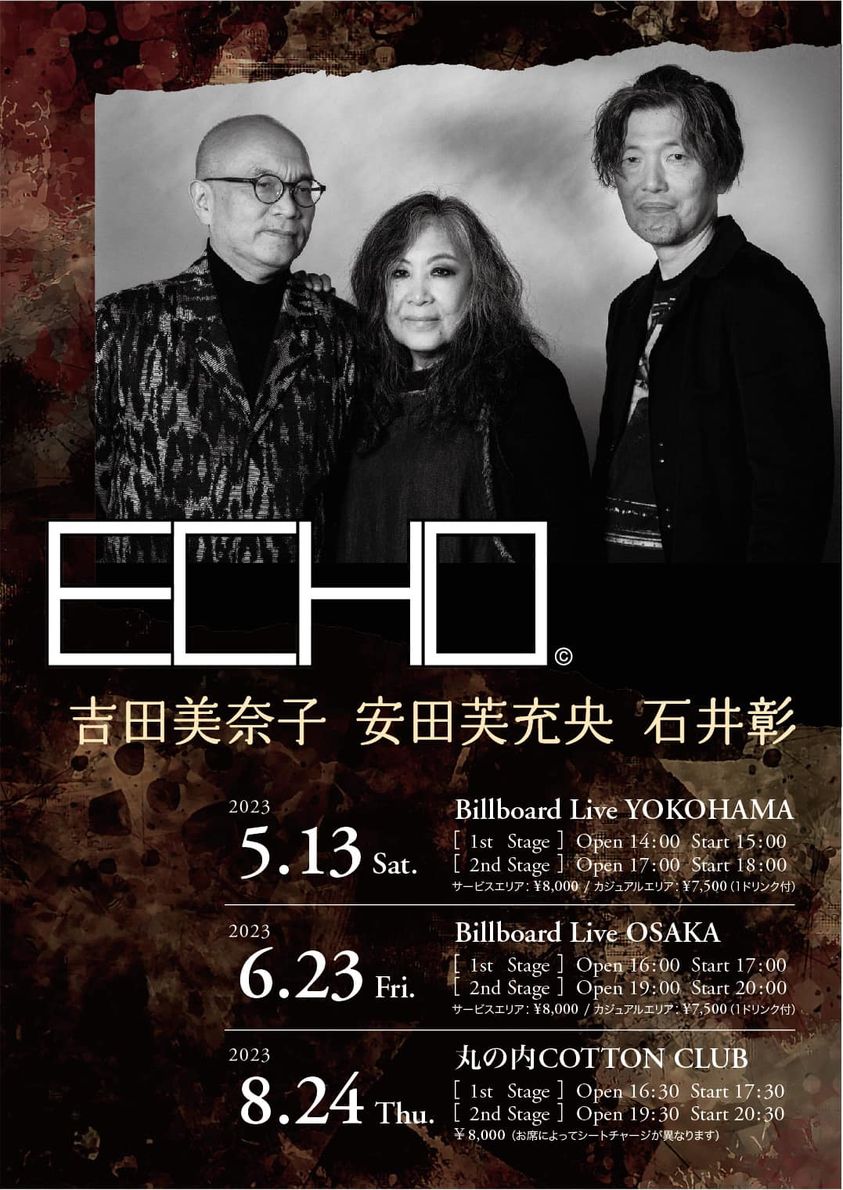
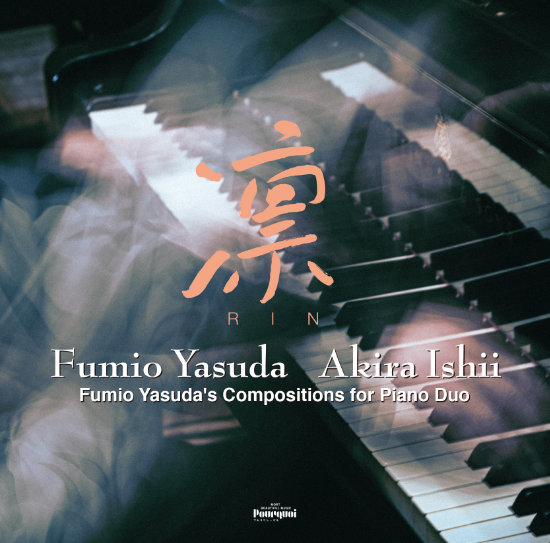
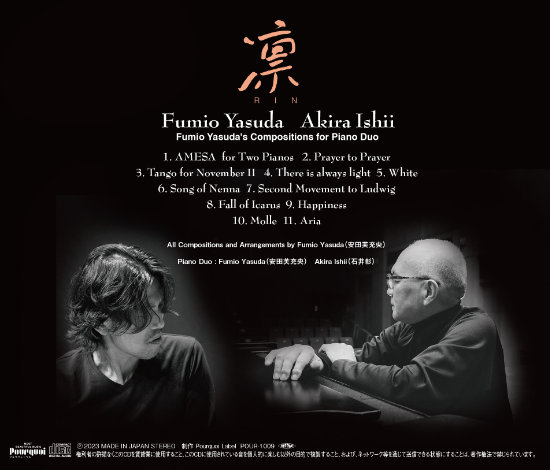
New frontiers for the piano duo.
New album for two pianos by Fumio Yasuda.
Eleven original gems.
With jazz pianist Akira Ishii.
Release date: 25 Jan (Wed) 2023
■ Product number: POUR-1009
■Price: ¥3000 (incl. tax)
![]()
Junichi Onuma Compositional Essays (Artes Publishing) has been published.
It contains an article about Fumio Yasuda.
An anthology of self-selected recordings from the German Winter and Winter labels spanning 20 years.
It is a compact and valuable overview of the multifaceted world of Fumio Yasuda. Yasuda is a poet among contemporary composers. ~His world of sound transcends national boundaries and inspires the desire to listen more and more deeply. Once you're hooked on his music, it's not a matter of free will; you want to listen to it again and again. (Winter and Winter, Producer: Stefan Winter)
Stefan Winter, producer, Winter and Winter, Germany, talks about the music of Fumio Yasuda
He also introduces the new album 'My Choice'. Please take a look.
Fumio Yasuda My Choice
Product Dimensions : 5.59 x 0.39 x 4.92 inches; 2.12 ounces
Manufacturer : Winter & Winter
Original Release Date : 2021
Date First Available : May 4, 2021
Label : Winter & Winter
ASIN : B0942FDSX1
Country of Origin : USA
Fumio Yasuda briefly describes his motivation as the attempt to invent something new, as he feels neither exclusively connected to classical music nor to the world of improvisation. He cites the late Romantic compositions of Franz Schmidt as decisive influences, but also John Cage's border crossings. Yasuda, born in 1953, is the poet among contemporary composers. He learned to play the classical piano in his childhood and studied composition at the Kunitachi College of Music in Tokyo. At 20, he joins the avant-garde jazz group "Angry Waves" led by Masayuki "Jojo" Takayanagi. His debut album "Kakyoku" on Winter & Winter "conquers... through the art of transforming the familiar into the own, of mirroring the model until something new has emerged in tiny mutations, possibly even blurs of vision." (Andreas Obst, F.A.Z.). Recordings are made with the Basel Chamber Orchestra, the European Art Orchestra, a soloist ensemble with musicians from the Stuttgart Chamber Orchestra conducted by Bernd Ruf, vocalist Theo Bleckmann, the Spanish baroque ensemble Forma Antiqva conducted by Aarón Zapico and the clarinettist Joachim Badenhorst together with Nobuyoshi Ino on bass and the singer Akimuse ("Forest"), in addition to piano solo productions and audio films (cinema for closed eyes) such as "Charmed with Verdi" and "On the Path of Death and Life".
The Ninth Wave - Ode to Nature
Successful European premiere.
19 December 2020, 20:00 (European time)
LIVE PERFORMANCE STREAMING at Schwere Reiter in Munich
Sound and film art with live performance
The performance is available on demand at the following link.
Please have a look.
https://youtu.be/GqP4wuaI3FQ
The Ninth Wave - Ode to Nature
Fumio Yasuda(Composition)
Stefan Winter(Director)
Piano for four Hands: Ferhan & Ferzan Önder
Clarinet: Joachim Badenhorst
Bass Clarinet: Gareth Davis
Viola: Kelvin Hawthorne
Viola: Klaus-Peter Werani
Conductor: Aarón Zapico
Sound and Noise: Mathis Nitschke(https://mathis-nitschke.com) & Stefan Winter
*Production: Mariko Takahashi for Neue Klangkunst gGmbH
I was lucky enough to lead this project in Munich a few days ago. It is cathartic, passionate, exciting and above all very personal. It has been a pleasure, an adventure and a challenge to what I can direct. I hope you enjoy it.
Conductor: Aaron Zapiko.
22:41 Ferzan
When I first saw the score, I couldn't believe it! I couldn't play it! I thought.
Fumio Yasuda is a very good jazz pianist and composer. I contacted Yasuda-san directly, consulted with him and we worked together. Working with him went very well and was wonderful. He said, 'Anything is possible. He said, 'Anything is possible, feel free to work on it. He said, 'Anything is possible. I felt a lot of tension when I was practising at home.
24:51
We sisters are very close, but in this piece we were fighting musically [in the score]. I would play the melody softly and Ferhan would come in with her guns blazing. It's really a 'war' (between man and nature), which is the concept of this piece.
26:51 Aaron Beethoven was a revolution. And I think it's also a small revolution to combine it here with the new piece that Fumio did.
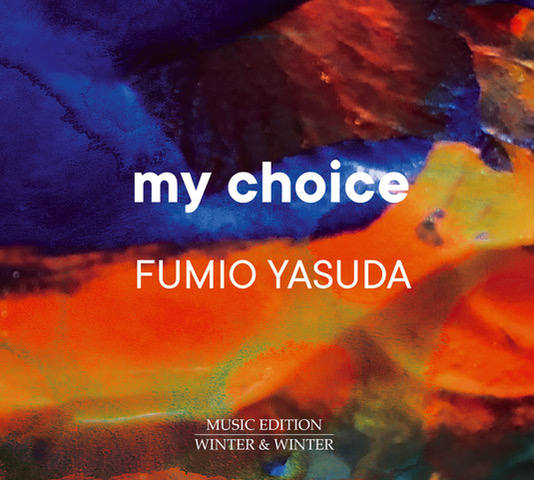
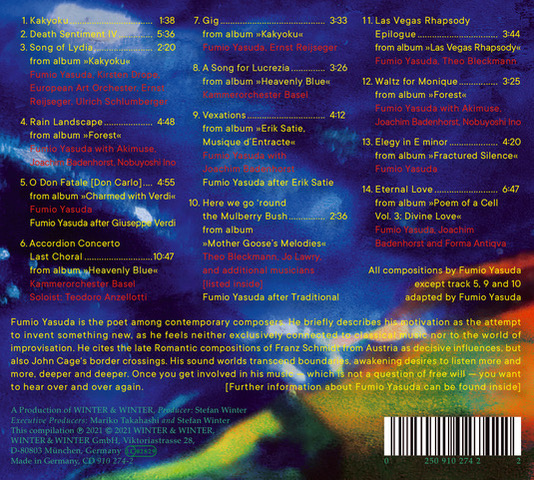

(内容の一部-訳)
~東京出身のピアニスト・作曲家である安田芙充央については、科学的に引かれた音楽ジャンルの境界線を無視することで、「Winter & Winter」の哲学を理想的な形で実現していることが読み取れます。この点で、彼の選択は、非常に幅広い関心事とその関係性を示しています。ジャズ・ピアニストとしての彼の腕前は、「Kakyoku(花曲)」でのソロ、「レイン・ランドスケープ」でのオノマトペによるヴォーカルやクラリネットの声との共演、また、バス・クラリネット奏者のヨアヒム・バーデンホルストが自由に装飾を施したエリック・サティの「Vexations」バージョンではプリペアド・ピアノで体験することができます。オーケストラ的には、「リディアの歌」に強烈なソプラノ・カンタスをつけたり、テオドーロ・アンゼロッティに捧げた「アコーディオン協奏曲」の「ラスト・コラール」に不吉な不協和音ブロックを配置したりしている。彼はスピリチュアリティを重視しているようです。〜
-ハンス・ディーター・グリュンフェルド-
お知らせ
タワーレコードでの販売はお取り寄せになりました。発送までの目安が14日~35日かかってしまいますので、AMAZONでのご購入をお勧めいたします。翌日配送可能です。